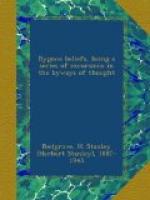[1] H. C. AGRIPPA: Occult Philosophy, bk. i. chap. xxxiii. (WHITEHEAD’S edition, p. 111).
Man, taught the old mystical philosophers, is threefold in nature, consisting of spirit, soul, and body. The Paracelsian mercury, sulphur, and salt were the mineral analogues of these. “As to the Spirit,” writes VALENTINE WEIGEL (1533—1588), a disciple of PARACELSUS, “we are of God, move in God, and live in God, and are nourished of God. Hence God is in us and we are in God; God hath put and placed Himself in us, and we are put and placed in God. As to the Soul, we are from the Firmament and Stars, we live and move therein, and are nourished thereof. Hence the Firmament with its astralic virtues and operations is in us, and we in it. The Firmament is put and placed in us, and we are put and placed in the Firmament. As to the Body, we are of the elements, we move and live therein, and are nourished of them:—hence the elements are in us, and we in them. The elements, by the slime, are put and placed in us, and we are put and placed in them."[1] Or, to quote from PARACELSUS himself, in his Hermetic Astronomy he writes: “God took the body out of which He built up man from those things which He created from nothingness into something . . . Hence man is now a microcosm, or a little world, because he is an extract from all the stars and planets of the whole firmament, from the earth and the elements, and so he is their quintessence.... But between the macrocosm and the microcosm this difference occurs, that the form, image, species, and substance of man are diverse therefrom. In man the earth is flesh, the water is blood, fire is the heat thereof, and air is the balsam. These properties have not been changed but only the substance of the body. So man is man, not a world, yet made from the world, made in the likeness, not of the world, but of God. Yet man comprises in himself all the qualities of the world.... His body is from the world, and therefore must be fed and nourished by that world from which he has sprung.... He has been taken from the earth and from the elements, and therefore, must be nourished by these.... Now, man is not only flesh and blood, but there is within the intellect which does not, like the complexion, come from the elements, but from the stars. And the condition of the stars is this, that all the wisdom, intelligence, industry of the animal, and all the arts peculiar to man are contained in them. From the stars man has these same things, and that is called the light of Nature; in fact, it is whatever man has found by the light of Nature.... Such, then, is the condition of man, that, out of the great universe he needs both elements and stars, seeing that he himself is constituted in that way."[1b]
[1] VALENTINE WEIGEL: “Astrology Theologised”: The Spiritual Hermeneutics of Astrology and Holy Writ, ed. by ANNA BONUS KINGSFORD (1886), p. 59.
[1b] The Hermetic and Alchemical Writings of PARACELSUS, ed. by A. E. WAITE (1894), vol. ii. pp. 289-291.




